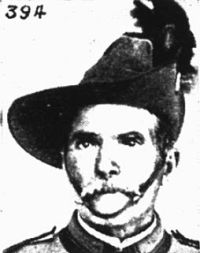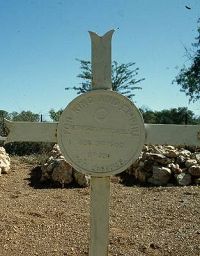Biography – Sgt-Maj James Mitchell
Regimental No 508 'A' Squadron NSW Bushmen's Contingent
James Mitchell, a native of Ayshire, Scotland, was in his fifty-eight year when he enlisted with the NSW Bushmen's Contingent. At a public farewell to the Tenterfield, NSW, recruits in the local gymnasium, he expressed a wish to bring back two of Kruger's teeth.1
Sergeant Major Mitchell sailed with the contingent on 28 February 1900, arrived in Capetown on 2 April and then proceeded via Marandelles to Bulawayo, Rhodesia (Zimbabwe). His squadron served under General Plummer in the engagements at Mafeking and Rustenburg. In a letter dated 14 June 1900, from Captain Thomas in Rustenberg, he remarked that the NSW Bushmen were:
... leading an irregular, nomadic gypsy sort of life, but with plenty to do – rising often at 2am, to set out on a march, with the frost on the ground ... all the Tenterfield boys are well, but Sergeant Major Mitchell was left at Bulawayo.2
Mitchell rejoined the squadron and with about 50 men from other details, defended Eland's River against De la Rey with 1,000 men and guns for 13 days, refusing to surrender on any terms. They were eventually relieved by Lord Kitchener's force on 15th August and Lord Methuen's column which arrived from the north on 18 August, 1900.3 Mitchell was wounded on 8 August.
The Rev James Green wrote:
Sergt-Major Mitchell, was badly hit in the knee. When the doctor put Mitchell under chloroform to examine the wound, he pulled his hand away from me (he was only partially under the influence), and waved it over his head, crying out: 'Now then, men, get out on parade'. Later, as he went quite under the power of the anaesthetic, he whispered: 'My word, they're getting me out on parade'. As the result of the doctor's examination, it was obvious that the only hope for Mitchell was the amputation of the leg above the knee. It was my duty to persuade him to submit to the operation, which was very cleverly performed in twenty-five minutes. Poor Mitchell, however, sank and died three days after. Whilst the grave was dug for Mitchell, the Boers opened out on the burial party, some of whom took refuge in it.
Col. Hore had forbidden me to conduct services over the dead at night, as it withdrew many men from the trenches in spite of orders. This was a double danger: it made a big mark at the grave for Boer rifle-fire, and left weak spots in our line of defence. Hitherto I had gone out; and, though I did not conduct any service – that was to be held later, when the relief came, which we were always expecting – I used to pray briefly.4
The burial service did not take place until 17 August. At this time, the Rev James Green took the opportunity to read the burial service over the graves of Sergeant Major James Mitchell and Troopers James Duff, John Waddell, James Walker. A single piece of slate served as a headstone for the four Bushmen.
Mitchell, a father of six, was mourned by his family and the community of Tenterfield. His wife Emily was recommended for a pension of £40 per year and a gratuity of one year's pay.5
The original headstone of slate that stood over the graves of Mitchell and his three fellow Bushmen is now on display in the Australians in South Africa gallery at the Australian War Memorial, Canberra. A number of years ago, four individual metal crosses replaced this headstone, which was then brought to Australia.
1 Valedictory, Complimentary Smoke Concert to Capt J F Thomas, Tenterfield Star, 20 February 1900. He was referring to Paul Kruger, the president of the Boer held Transvaal State.
2 At the Front – Letter from Captain Thomas, Tenterfield Star, 7 August 1900.
3 Official Records of the Australian Military Contingents to the War in South Africa, P L Murray, Melbourne 1911.
4 The Story of the Australian Bushmen (being Notes of a Chaplain), James Green, Sydney, 1903.
5 Pension Board Papers, Australian War Memorial Series No AWM1 Item 5/6.




